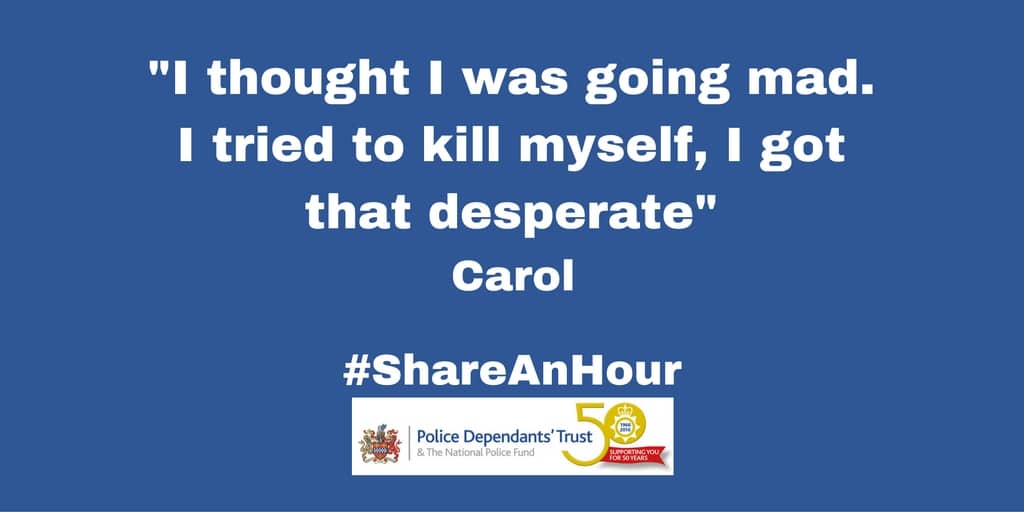

A former police officer who suffered a catalogue of physical and mental health issues after a serious assault on duty is embarking on a new career, with the support of the Police Dependants’ Trust.
In the 1980’s Carol suffered a fractured skull and a bleed on the brain when she was viciously assaulted. The blows to her head caused her to have a seizure. Within months of the incident Carol’s personality changed:
“I went from being quite laid back to being aggressive and emotional. I used to get the shakes and at times I couldn’t read or write properly. I became very depressed and was snappy; I wasn’t a very pleasant person.”
Over time the problems worsened and, assuming she was perhaps drinking a little too much, Carol cut out alcohol altogether. But the shaking continued and Carol felt she was becoming a liability.
It was a stark ultimatum from a colleague that prompted Carol to seek help. She was admitted to a mental hospital out of hours and staff initially believed she had schizophrenia. It’s only when a leading specialist saw Carol and they spoke at great length, that her head injury come up. Finally, four years after the assault, Carol began to receive treatment.
“I was sent for a head x-ray and scans which showed up the fracture. They also showed damage to my temporal lobe and frontal lobe, which means I’m disinhibited. I was told I couldn’t go back to work.”
“It affected me quite badly. I joined the police when I was 19 and I was suddenly out of a job. I had a lot to contend with and my mental health was getting worse.”
Leaving the service put a strain on Carol’s finances and she could no longer afford medical insurance. She was placed in a local NHS facility for six months which wasn’t a pleasant experience (“back then mental health was the poor relation”).
Having finally been put on an effective treatment programme Carol seized an opportunity to move to a new area and start afresh. She got involved in a number of community groups, which not only boosted her confidence and self-esteem, but helped her to meet lots of people. One in particular encouraged her to enrol on a Leadership and Development Course.
“For the first time in my life I felt like I belonged and that I was part of a team. For so many years I’d had people telling me that I was a write-off, and here was someone saying ‘you can do it!’.”
Carol completed the course and was encouraged by her tutors and others to consider going to university. But finances were tough and Carol was worried about money. One of her colleagues suggested she contact the Police Dependants’ Trust.
When officers have been medically retired due to a physical or psychological injury on duty, the Trust can help with the cost of retraining; while it’s no longer possible to be a police officer, there are often a wealth of other career paths on offer.
Carol is studying to become a social worker. She has just finished her first year at university and passed all of her exams. She is also in a relationship, having been reunited with the partner she split from shortly after she was assaulted. It has been a long road.
“This wasn’t supposed to happen. I was a write off; I’d had psychologists tell me I was a write off. Before I got the proper treatment I was having hallucinations. I thought I was going mad. I tried to kill myself, I got that desperate.”
“I have always wanted to be a social worker, even when I was a cop. At work we had a lot to do with homeless people and I was always interested in what got them to the point they were at. Everyone has got a story and being in and out of the mental health system over the last 30-odd years I’ve seen what people often want is someone to listen to them and put an arm around them. I think that’s what people are missing.”
“The university course would be out of reach if I hadn’t had the support from the Trust. If I hadn’t gone to uni I don’t have a clue what I would be doing. I love life now, but it has taken me 33 years to get from there to here.”
“If you have got a dream, go with it. The day you lose hope is the day you have given up.”
